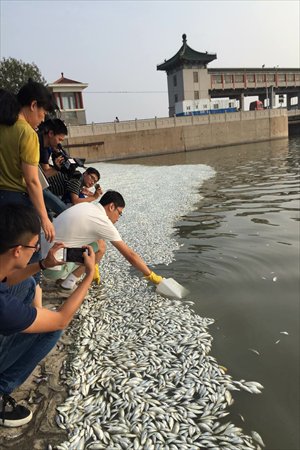Water at Tianjin blast site contaminated
Govt eases concerns on cyanide pollution after dead fish turn up in river

An official with local fisheries authority in Tianjin takes dead fish and water samples from Tianjin's Haihe River on Thursday for investigation, after dead fish were found floating along the shore on a 100-meter stretch, triggering wide speculation. Photo: Liu Xin/GT
Eight out of 42 water quality monitoring sites set up around the Tianjin blast area reported presence of highly-toxic cyanide exceeding the standard, with one site exceeding 356 times the normal level, authorities announced Thursday.
Deng Xiaowen, head of Tianjin's environment monitoring center, said at a Thursday press conference that 25 of the 42 water quality monitoring sites set near the blast sites have detected cyanide, and eight found the cyanide content to exceed the normal standard set by the municipal environment authorities for wastewater discharge and surface water quality.
Five sites in the offshore area found that the cyanide content was within limit, with no significant change compared with previous records, Deng said.
Tian Weiyong, head of the emergency response center with the ministry of environmental protection, said cofferdams have been built to block cyanide-tainted water in the blast zone. Authorities have also closed sewage outlets to the sea and used cement to block all drain outlets at the blast site to avoid pollution of water outside the site.
The tainted water will not be discharged if it is not safe to do so, according to Tian.
Pollutants have also been found in the 276 air samples collected between Wednesday and Thursday, including toluene, hydrogen cyanide and volatile organic compounds. However, monitoring sites near the explosion area showed that the substances have not exceeded the limit, officials said at the meeting.
Meanwhile, local authorities have refuted public speculation about the possible pollution of water with cyanide after a large amount of dead fish were found floating in the upstream of Tianjin Haihe River Thursday. Officials said that sample tests did not detect presence of cyanide.
The Global Times reporter on the site found that the dead fish were spread across an area of about 100 meters long and all of the same variety. Some officials at the scene told reporters that the fish is called stickleback and is very sensitive to the environment.
Deng said the reasons behind the dead fish will be investigated, adding that this is not the first time dead fish are found in the upstream of the river as the water condition is not suitable for the fish at certain times. "When the temperature rises, oxygen will evaporate and fish may die of hypoxia," he said.
Zhang Yunli, head of a local marine fisheries association in Tianjin, told the Global Times that he believed the death of the fish is not related to the blast but with the change in water's salinity, which happens every year.
The same conclusion was reached by Chen Zhaogang, a local fisherman who has been fishing for over 10 years.
An official at the Tianjin Fisheries Law Enforcement surnamed Bi told reporters that the presence of a large number of fish in the river on cloudy, rainy days will also result in hypoxia in the water, adding that the amount of dead fish in 2011 was much greater than this year.
Gao Donglu, a deputy political commissar with the Beijing Military Region, told the Global Times that the public and media should understand that the dead fish is a type of natural phenomenon and should not read too much into it.
Until Thursday 3 pm, 114 people were killed in the blasts including 56 firemen and seven police officers, 69 people are still missing including 48 firemen and four police, the government confirmed.
The authorities revealed that about 40 types of chemicals weighing 2,500 tons were stored in the warehouse. They are mainly oxides, inflammable substances and toxic chemicals including 700 tons of cyanide.
President Xi Jinping and other top Communist Party of China (CPC) leaders called for diligent and professional response to the Tianjin explosions on Thursday.
Xinhua contributed to the story